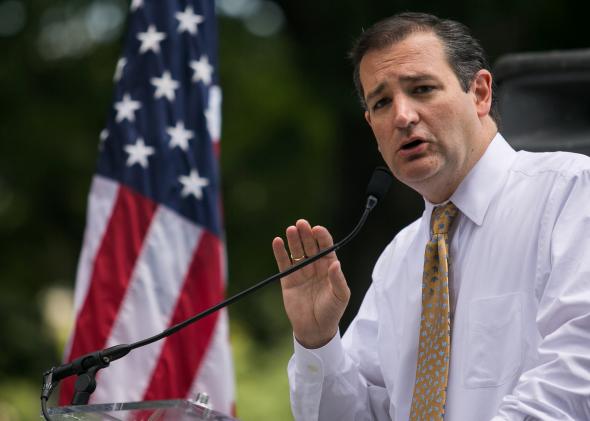Ted Cruz and the Walter Mondale Myth

Photo by Drew Angerer/Getty Images
I'm back from a book-writing jaunt (sadly, not a book-completing jaunt, not yet), and what better way to return to the fray of politics than by discussing the 1984 presidential election?
The umpteenth entry in the ongoing Ted Cruz profile series comes from Jeffrey Toobin, and it's a good 'un. A very meta one, too. Toobin manages to get Cruz, who prefers to stick to tested themes, describing his theory of argument. "Every battle is won before it’s fought," says Cruz, describing how he argued cases. "It’s won by choosing the terrain on which it will be fought."
Toobin ends up adopting Cruz's framing for many key events, from the defeat of the disabilities treaty (which plenty of conservatives lobbied on) to the "wacko birds" insult (which John McCain quoted from a WSJ op-ed, and which Cruz happily repeats for crowds), to the government shutdown. "While the government was closed," writes Toobin, "the Obamacare Web site, healthcare.gov, made its disastrous début, and the polls turned against the Democrats."
In reality, the two-week shutdown ended after Democrats bounced in the polls. The swoon only came after it ended, and media attention returned to the HealthCare.gov debacle. Had there been no shutdown, had the media been focused on HealthCare.gov during the nadir—remember the first day, when only six human beings could sign up?—the swoon would have come earlier and harder.* But in the nation's most prestigious magazine, the narrative of the shutdown is the one preferred by Cruz.
Anyway, not my point. I come to quibble with Toobin and an anonymous Democrat.
Cruz’s concerted attempt to establish himself as the most extreme conservative in the race for the Republican nomination has not evoked much fear in Democrats. “We all hope he runs,” one Democratic senator told me. “He’s their Mondale.” (Running against Reagan as an unalloyed liberal in 1984, Walter Mondale lost every state but his native Minnesota.)
The idea that Walter Mondale lost that election so badly because he ran too far to the left is really unkillable. It's a little simpler than the truth. Mondale only won his nomination after an extended primary fight with Gary Hart, and yes, he did represent the labor and progressive wings of the party against Hart's studied reform politics. But the "Mondale ran to the left" trope is based on a commonly misunderstood line from his 1984 acceptance speech. Here is how it's remembered.
Mr. Reagan will raise taxes, and so will I. He won't tell you. I just did.
The "lesson" is that Mondale promised to raise taxes and voters rejected it. But why was he saying this? Read the whole section of the speech.
Here is the truth about the future: We are living on borrowed money and borrowed time. These deficits hike interest rates, clobber exports, stunt investment, kill jobs, undermine growth, cheat our kids, and shrink our future.
Whoever is inaugurated in January, the American people will have to pay Mr. Reagan's bills. The budget will be squeezed. Taxes will go up. And anyone who says they won't is not telling the truth to the American people.
I mean business. By the end of my first term, I will reduce the Reagan budget deficit by two-thirds.
Let's tell the truth. It must be done, it must be done. Mr. Reagan will raise taxes, and so will I. He won't tell you. I just did.
There's another difference. When he raises taxes, it won't be done fairly. He will sock it to average-income families again, and leave his rich friends alone. And I won't stand for it. And neither will you and neither will the American people.
To the corporations and freeloaders who play the loopholes or pay no taxes, my message is: Your free ride is over.
To the Congress, my message is: We must cut spending and pay as we go. If you don't hold the line, I will: That's what the veto is for.
Mondale's tax line was a deficit-scold line. And it wasn't a one-off. Mondale's campaign ads asked voters to consider what the future would hold if Reagan kept running deficits. “There are plans today to put you $18,000 in debt: your share of Mr. Reagan's deficits," ran one ad. "But when Mondale moves into the White House, he won't forget about your place. He'll cut spending, close tax loopholes, and put new taxes in a trust fund to pay off Reagan's debt.”
The problem with this was that voters didn't truly worry about the deficits when the economy was growing. The recession of the early 1980s had ended by the time Mondale won his party's nomination—what had looked like a valuable chance to challenge a failing president had become basically worthless. (In the winter of 1982, polls showed that either Mondale or Ted Kennedy would beat Reagan.) Mondale tried to counteract this by insisting that the good times were based on a bubble of bad debt.
“Ronald Reagan says the economy is moving up," read one ad. "It is: up on a mountain of debt and record Reagan deficits. More borrowing than all the other presidents in history combined. That will drive interest rates up, slow the economy down,”
Several points here. One, most obviously, the out-of-power party doesn't run well when the economy is booming. Two, the deficit-scold message only works when the economy is slumping. (That's a little frustrating, as these are the times when deficit spending makes the most sense.) Three, it's better to get "the narrative" right, but convincing the media you got it right and convincing the voters are actually different skills.
*I remember this vividly, because I crowdsourced a story about how a few people without insurance were adapting to Obamacare, and to my surprise none of the subjects could log on.
